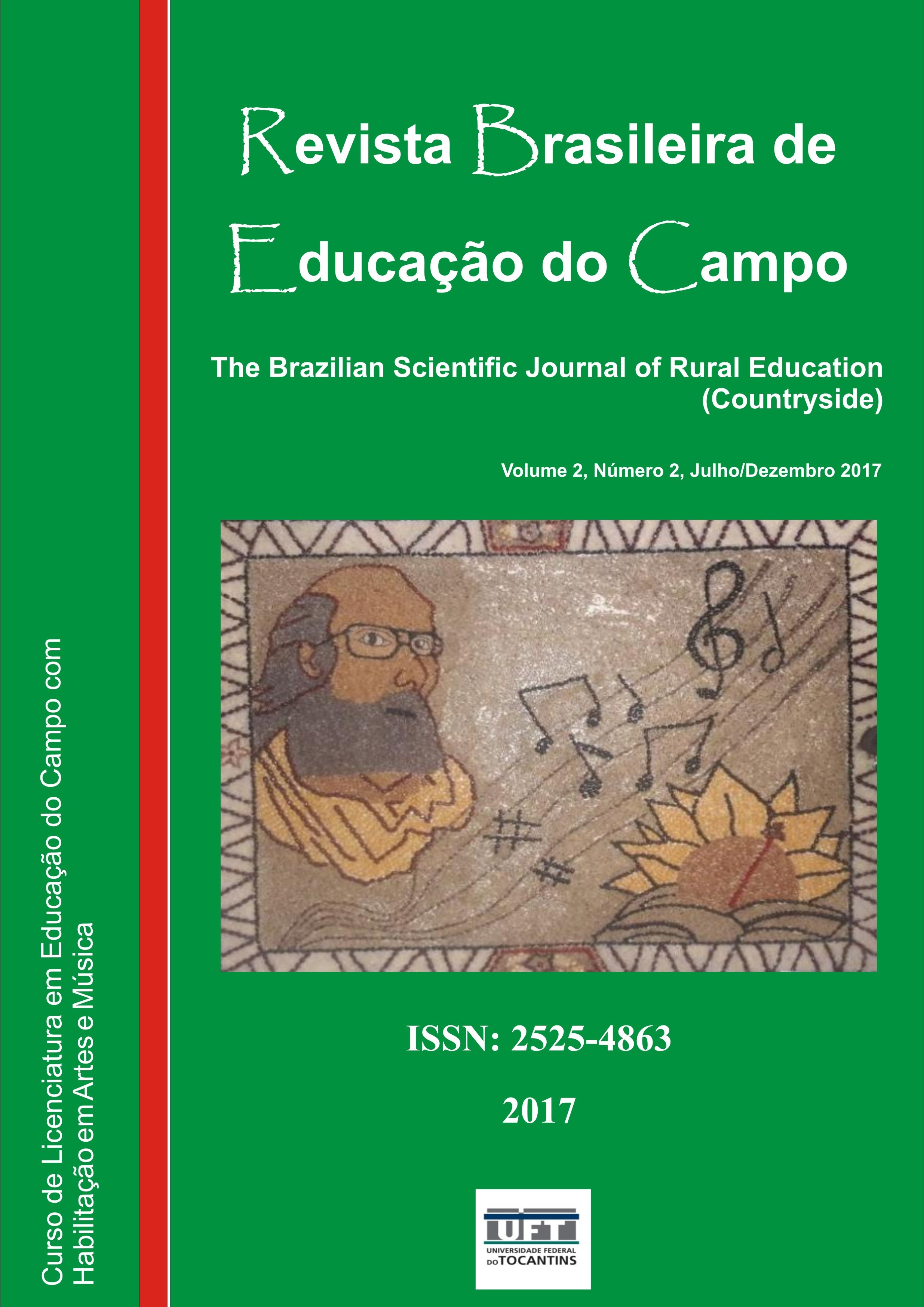The construction of the analytical category “Rural” in Brazil - Possibilities for Rural Education
DOI:
https://doi.org/10.20873/uft.2525-4863.2017v2n2p811Abstract
ABSTRACT. The text that follows approaches the construction of the analytical category "Rural" in the Brazilian national context. Rather than forging such a categorization, both the influence of Pedagogical Ruralism in the elaboration and implementation of a given project, research on the peasant context, projected the image of the Field and its Subjects in order to accommodate or not groups that construct the rural areas. Through the bibliographic research and Content Analysis (Franco, 2005), we conducted a search of the field from researches in the period between 60 and 90. We aim to understand this process of elaboration of the Field as a category of Education, questions about the conceptual element. It´s consider the contribution of this exercise, above all, to understand this process along with its repercussions to the studies and practices experienced in the Field Education field. The outstanding approaches, primordial contributions, located in their time, point to the various relations with agriculture and its constitution. However, they do not show the possibility of other activities and other peculiarities that are not directly linked to the category "work" present in the Rural. The test allows the opening of new approaches, inviting the reinvention of the analytical category "Rural".
Keywords: Field, Research Category, Field Education.
Downloads
Literaturhinweise
Andrade, M. C. (2009). As tentativas de organização das massas rurais - as Ligas Camponesas e a sindicalização dos trabalhadores do campo (1963). In Welch, C. A. et al. (Orgs). Camponeses brasileiros: leituras e interpretações clássicas (pp.73-85). São Paulo, SP: Editora UNESP; Brasília, DF: Núcleo de Estudos Agrários e Desenvolvimento Rural.
Arroyo, M. G., Caldart, R. S., & Molina, M. C. (2009). Por uma educação do campo. Petrópolis, RJ: Vozes.
Baer, W. (1995). A economia brasileira. São Paulo, SP: Editora Nobel.
Franco, B. Análise de conteúdo. (2005). Brasília, DF: Líber Livro.
Gonçalves, C. W. P. (2004). Geografia da riqueza, fome e meio ambiente: pequena contribuição crítica ao atual modelo agrário/agrícola de uso dos recursos naturais. Revista Internacional Interdisciplinar Interthesis PPGICH UFSC. DOI: http://dx.doi.org/10.5007/%x
Neves, D. P. (2009). Constituição e Reprodução do campesinato no Brasil: legado dos cientistas sociais. In Neves, D. P. (Org.) Processos de constituição e reprodução do campesinato no Brasil: formas dirigidas de constituição do campesinato (pp. 303-325). São Paulo, SP: Editora UNESP; Brasília, DF: Núcleo de Estudos Agrários e Desenvolvimento Rural.
Oliveira, F. (1989). A economia da dependência imperfeita. Rio de Janeiro, RJ: Editora Grall.
Pereira, L. C. B. (1986). Lucro, Acumulação e Crise. São Paulo, SP: Editora Brasiliense.
Pereira de Queiroz, M. I. (2009). Uma categoria rural esquecida (1963). In Welch, C. A. et al. (Org.). Camponeses brasileiros: leituras e interpretações clássicas. São Paulo, SP: Editora UNESP; Brasília, DF: Núcleo de Estudos Agrários e Desenvolvimento Rural.
Pires, A. M. (2012). Educação do campo como direito humano. São Paulo, SP: Cortez.
Prado, A. (1995). Ruralismo pedagógico no Brasil do Estado Novo. Estudos Sociedade e Agricultura, 5-27. Recuperado de: http://biblioteca.clacso.edu.ar/ar/libros/brasil/cpda/estudos/quatro/adonia4.html
Toledo, C. N. (2004). 1964: O golpe contra as reformas e a democracia. Revista Brasileira de História, 24(47). DOI: http://dx.doi.org/10.1590/S0102-01882004000100002
Woortmann, K. (1990). “Com parente não se neguceia”: o camponês como ordem moral. Anuário Antropológico, 87, Brasília: UNB.
Veröffentlicht
Zitationsvorschlag
Ausgabe
Rubrik
Lizenz
Creative Commons Attribution License
Creative Commons Attribution License
Proposal for Copyright Notice Creative Commons
1. Policy Proposal to Open Access Journals
Authors who publish with this journal agree to the following terms:
A. Authors retain copyright and grant the journal right of first publication with the work simultaneously licensed under the Creative Commons Attribution License that allows sharing the work with recognition of its initial publication in this journal.
B. Authors are able to take on additional contracts separately, non-exclusive distribution of the version of the paper published in this journal (ex .: publish in institutional repository or as a book), with an acknowledgment of its initial publication in this journal.
C. Authors are permitted and encouraged to post their work online (eg .: in institutional repositories or on their website) at any point before or during the editorial process, as it can lead to productive exchanges, as well as increase the impact and the citation of published work (See the Effect of Open Access).














